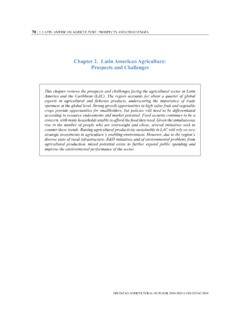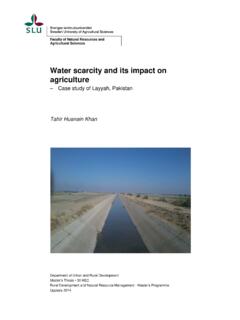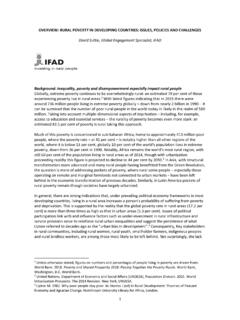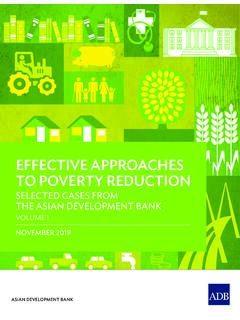Transcription of Contribution of Agriculture to Economic Growth in Nigeria1
1 Contribution of Agriculture to Economic Growth in Nigeria1 Tolulope Odetola and Chinonso Etumnu Senior Research Assistants, International Food Policy Research Institute (IFPRI), Abuja, Nigeria. To be presented at: The 18th Annual Conference of the African Econometric Society (AES) Accra, Ghana at the session organized by the Association for the Advancement of African Women Economists (AAAWE), 22nd and 23rd July, 2013. 1 A work in progress 2 Abstract This paper investigates the Contribution of the Agriculture sector to Economic Growth in Nigeria using the Growth accounting framework and time series data from 1960 to 2011. We find that the Agriculture sector has contributed positively and consistently to Economic Growth in Nigeria, reaffirming the sector s importance in the economy.
2 The Contribution of Agriculture to Economic Growth is further affirmed from a causality test which showed that Agriculture Growth Granger-causes GDP Growth , however no reverse relationship was found. The resilient nature of the sector is evident in its ability to recover more quickly than other sectors from shocks resulting from disruptive events civil war (1967-70) and Economic recession (1981-85) periods. We also find that the crop production subsector contributes the most to Agriculture sector Growth and that Growth in the Agriculture sector is overly dependent on Growth of the crop production subsector. This indicates the importance of this subsector and probably, lack of attention or investment to the other subsectors.
3 Therefore, increased efforts in developing the livestock, fisheries and forestry subsectors will foster the contributions of Agriculture sector to the Nigerian economy. Key words: Agriculture , Economic Growth , GDP, Nigeria, Growth Accounting, Granger causality tests. JEL Classification: Q1, O4, O55 3 1. Introduction The relationship between Agriculture and development, especially in Sub-Saharan Africa, cannot be overemphasized. As a roadmap to attaining development, the Millennium Development Goals (MDGs) 2 was adopted in year 2000 and in Africa, 70% of the development target group live in rural areas and are dependent on Agriculture for a living (IFPRI, 2004). Invariably, reducing poverty , improving nutrition and general well-being of the population would imply improving the livelihood of this majority and this hinges critically on the performance of the Agriculture sector.
4 For example, using World Development Indicator (WDI) data from Nigeria for selected periods, we find a strong positive correlation between food production and primary school enrollment ratio and gender equality while there is a strong negative correlation between food production and child mortality rates3. This gives some evidence on the importance of Agriculture in Economic development. However, sustained Economic development cannot be achieved without Economic Growth . As expressed by the World Bank (2006), high poverty level will lead to low Growth and low Growth will lead to high poverty level. Thus, Economic Growth is necessary for sustained Economic development (Akanbi & Du Toit, 2011; World Bank, 2006).
5 This paper investigates the Contribution of Agriculture to aggregate Economic Growth in Nigeria. The fact that Economic Growth is necessary for sustained development, coupled with data limitation, informs our focus on investigating the contributions of Agriculture to Economic Growth , as measured by Gross Domestic Product (GDP), in Nigeria. The literature has established a relationship between Agriculture sector and Economic Growth (Gallup et al., 1997; Thirtle, Lin & Piesse, 2003; Awokuse, 2008; Irz et al., 2001). We contribute to this literature using Solow s Growth accounting framework and estimate our model with time series data on the Nigerian economy from 1960 to 2011. Similar to Collins & Bosworth (1996) and Iyoha & Oriakhi (2002), we consider the contributions of Agriculture sector as a source of Growth in the economy.
6 In our model, aggregate output Growth is conceptualized as the sum of Growth contributions from each sector of the economy. We further modify the model to provide evidence on the importance of the Agriculture subsectors in the Growth of the sector. In this 2 MDG goal 1 is to eradicate poverty and extreme hunger. This is directly linked to Agriculture through availability and access to food. Increased food production can only be achieved through agricultural Growth . 3 See correlation results in appendix. 4 second model, Growth in the Agriculture sector is taken to be the weighted sum of the Growth in the sub-sectors of the Agriculture sector namely, crop production, livestock production, fisheries and forestry.
7 We also expect that disaggregating the Agriculture sector will provide clearer evidence on how Agriculture contributes to Economic Growth by highlighting the sources of Growth in the Agriculture sector. Furthermore, we conduct Granger causality test to investigate a bidirectional causality relationship between GDP Growth and agricultural Growth . This will give additional evidence on the Contribution of Agriculture to Economic Growth on Nigeria. The importance of this study stems from the role of Agriculture in Nigerian economy based on its size, potential and prospects. In Nigeria, because 70% of the population is employed in the Agriculture sector, Economic Growth will be almost impossible to achieve without developing the sector.
8 Furthermore, the importance of Agriculture to the Nigerian economy is evident in the nation s natural endowments in production factors extensive arable land, water, human resources, and capital. Exploring the nation s productive advantage in this sector is the fastest way to stimulate Growth in the economy. Research on this issue is therefore important to help inform policy decisions regarding resource allocation in agricultural Growth and development to achieve rapid Economic Growth . The literature is replete with studies that analyze the Agriculture sector of the Nigerian economy. It gives evidence of a positive relationship between Agriculture sector investment and GDP Growth . Iganiga and Unemhilin (2011) and Oji-Okoro (2011) found that agricultural output is significantly influenced by government capital expenditure.
9 Iyoha and Oriakhi, (2002) identified the sources of Economic Growth in Nigeria using the Growth accounting model and found that Agriculture contributes more than expected to GDP Growth . According to the paper, this indicates a lag in the nation s industrialization process. They also find that the share of labour involved in Agriculture is too high and suggest that labour be reallocated to other sectors to accelerate Economic Growth . Recently, Olajide et al. (2012) used Ordinary Least Squares (OLS) regression method to analyse the relationship between agricultural resource and Economic Growth in Nigeria between 1970 and 2010. They found a positive causal relationship between GDP and agricultural output in Nigeria, however their study was limited to showing only that Agriculture and GDP Growth rate are related.
10 5 Our study makes some contributions to this growing literature. First, we provide a basis for comparison between the Agriculture sector s Contribution to Growth and those of other sectors in Nigeria by including other secors namely industy, wholesale and retail trade, building and contruction and services as other sources of Economic Growth in our model. Second, we do not merely consider the share of Agriculture in GDP but the weighted Growth rate ( Growth rate weighted by size of sector) of the Agriculture sector on Economic Growth . Finally, we give evidence of the impact of Growth in each subsector of the Agriculture sector will have on Growth in the sector as further evidence on the source of Economic Growth .




